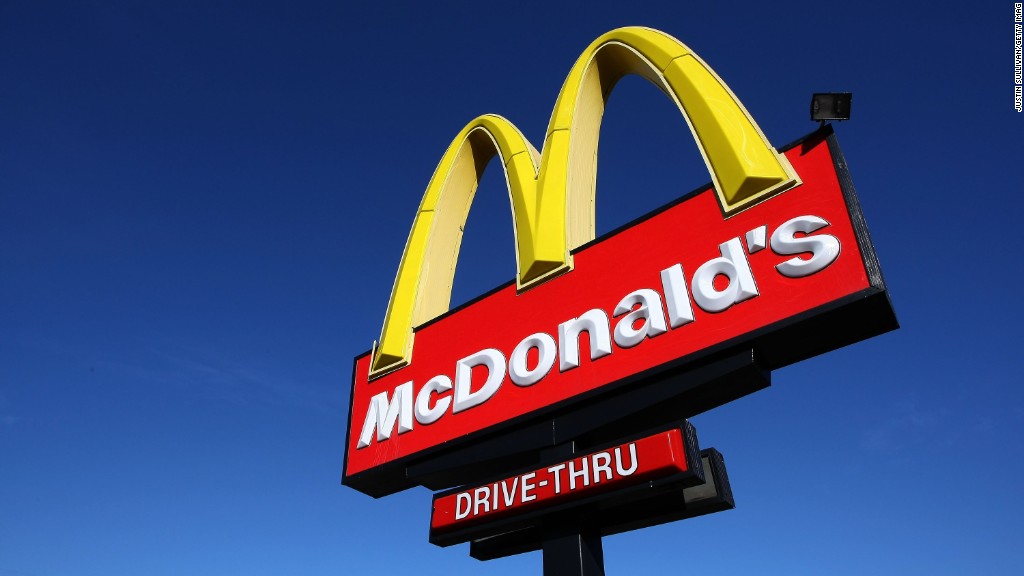
Chalk one up for Main Street: Hundreds of thousands of American workers are finally getting a raise.
Pay hikes at McDonald's (MCD), Target (TGT), TJX Cos (TJX) and Wal-Mart (WMT) are great news, especially given how anemic wage increases have been since the Great Recession.
While it's a rare win for everyday Americans, don't expect Wall Street to cheer just yet.
If wage hikes don't encourage consumers to spend more -- something that cheap oil has so far failed to do -- they won't help the stock market much. Yet higher labor costs will increase expenses on companies at a time when they may not be able to balance them out by raising prices. That's not good for investors.
"In contrast to what was seen over the past six years, what could be good now for Main Street may not be so for Wall Street," said Peter Boockvar, chief market strategist at The Lindsey Group.
Related: McDonald's is giving 90,000 workers a raise
Finally! Pay raises are coming: American workers haven't had as much to celebrate during the economic recovery as investors. While the stock market has shattered records, wages have barely grown compared with the economy and inflation.
Worker compensation -- including pay, health insurance, pensions and employer-paid benefits -- relative to the U.S. economy is at the lowest level since 1948, according to the Bureau of Economic Analysis.
Yet now the labor market has improved enough that at least some large companies are fighting to keep talent by slowly increasing pay. Earlier this week McDonald's revealed plans to boost hourly wages by more than 10% for roughly 90,000 workers.
"Employees have more leverage and employers are starting to respond," said Boockvar. "The pendulum of wages relative to profits swung way too far in one direction. Now it's slowly beginning to move back the other way."
Related: Atlanta Fed cuts U.S. growth forecast to zero
Margin destruction ahead? The shift in the labor market has a negative implication for profit margins, a measure of corporate efficiency that has climbed to high levels thanks in part to stagnant wages. High margins have in turn helped lift stock prices.
Of course, not all companies will feel the margin pressure. Only the ones employing large amounts of low-wage workers.
Also, it's pretty normal at this stage of the economic cycle to see margins take a breather. There are only so many costs companies can squeeze.
Companies will naturally try to offset the higher costs by raising prices on products. Yet it's not clear they will have the pricing power to pass these costs on to consumers.
Just look at consumer spending. It inched up just 0.1% in February following two months of outright declines. Even cheap gasoline hasn'r perked up spending. Many Americans seem to be hoarding the $750 they will save from cheap gas this year rather than spending it.
"This time we may see a heavier deterioration of margins than we normally would at this point in the cycle," said Bruce McCain, who helps oversee more than $20 billion as chief investment strategist at Cleveland's Key Private Bank, a division of KeyCorp.
Related: The wild ride in stocks isn't over
Wage hikes could lead to Fed rate hikes: If companies are able to boost prices that would be good news for the Federal Reserve, which is failing to hit its 2% inflation target. The Fed is in no rush to raise rates until it's confident inflation will improve to healthier levels.
But investors get nervous about anything that speeds up the timetable or the pace of interest rate hikes. That's because extremely low rates make risky assets like stocks look that much more attractive.
Related: Stock market risks may be rising
Consumer spending is the key: Of course, there is a way for both Main Street and Wall Street to come out as winners from the wage hike story. If higher pay triggers a meaningful boost in spending, that would be huge for the stock market as well as the economy, which still takes its cues from consumers.
Wage hikes "are not a positive for corporate earnings in the near term, but they could have the potential of fueling further expansion in terms of consumer spending," said Peter Kenny, chief market strategist at The Clearpool Group.
That could lead to further wage hikes and a stronger job market.
"It's another way of pushing that virtuous cycle to a close," said Kenny.


